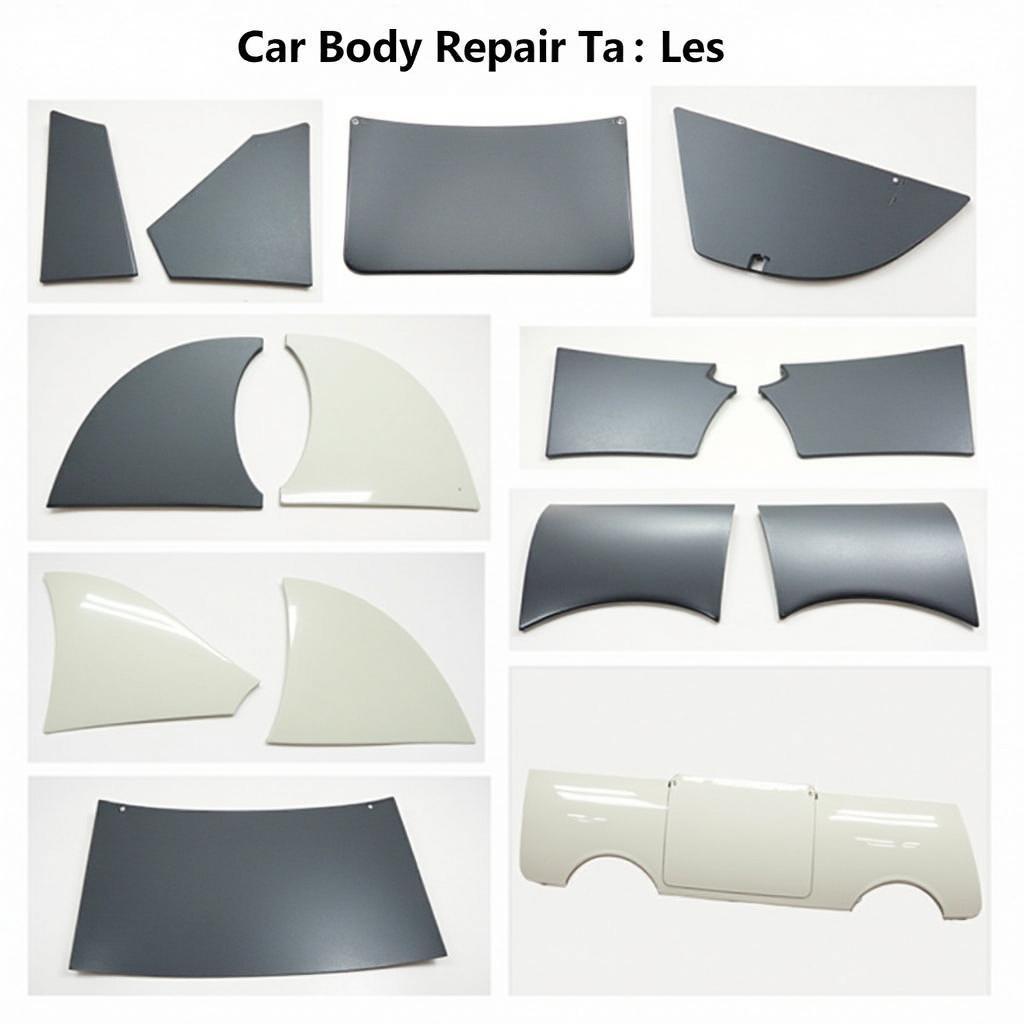Choosing the right car body repair panels supplier can be a daunting task, especially with so many options available. Whether you’re a seasoned mechanic or a car enthusiast tackling a DIY project, you need a supplier that delivers high-quality panels at competitive prices. This comprehensive guide will walk you through everything you need to know about finding a reliable car body repair panels supplier, ensuring your repair or restoration project is a success.
What to Consider When Choosing a Car Body Repair Panels Supplier
Before diving into the vast sea of suppliers, take a moment to consider your specific needs and priorities. These factors will guide you toward the right supplier for your project.
1. Quality First: Materials and Manufacturing Processes
The quality of car body repair panels directly impacts the longevity of your repair and the overall appearance of your vehicle. Always prioritize suppliers who source high-grade materials, such as steel, aluminum, or fiberglass, depending on the specific panel and vehicle model.
Look for suppliers who utilize modern manufacturing techniques, such as stamping or hydroforming. These methods ensure precision in dimensions and consistent quality, leading to easier installation and a better fit.
2. The Perfect Match: Vehicle Compatibility and Panel Selection
A wide selection of car body repair panels is crucial, especially if you’re working on a less common or older vehicle model. The right supplier should stock a vast inventory, including:
- Fenders: Front and rear, driver and passenger sides
- Hoods: Standard, cowl induction, and aftermarket options
- Doors: Complete doors, door skins, and door shells
- Quarter Panels: Full and partial panels for different vehicle sections
- Rocker Panels: Protecting your vehicle’s undercarriage from corrosion
Furthermore, ensure the supplier offers panels compatible with your specific vehicle’s make, model, and year.
3. Navigating Costs: Price and Value for Money
Price is undoubtedly a key factor when choosing a supplier. However, remember that the cheapest option isn’t always the best. Strive for a balance between competitive pricing and excellent value.
- Compare quotes: Obtain quotes from multiple suppliers to gauge the average market price.
- Inquire about discounts: Ask about potential discounts for bulk orders, mechanic programs, or seasonal sales.
- Factor in shipping costs: Shipping costs can significantly impact the overall price, especially for larger panels.
4. Timely Delivery: Shipping Options and Lead Times
Delays in receiving your car body repair panels can stall your entire project. Prioritize suppliers who offer:
- Multiple shipping options: Choose from standard shipping, expedited delivery, or freight options based on your urgency and budget.
- Transparent tracking: Receive regular updates on your order’s whereabouts and estimated delivery time.
- Reliable customer service: Promptly address any shipping concerns or questions you may have.
5. Building Trust: Reputation and Customer Reviews
A supplier’s reputation speaks volumes about the quality of their products and services. Before making a decision, research their reputation:
- Online reviews: Explore customer reviews on platforms like Google My Business, Yelp, or industry-specific forums.
- Industry forums: Engage with fellow mechanics or car enthusiasts to gather insights and recommendations.
- Better Business Bureau (BBB): Check the supplier’s BBB rating to assess their customer service history and business practices.
6. Beyond the Panel: Additional Services and Support
While your primary focus is on car body repair panels, consider suppliers who offer additional services, such as:
- Technical support: Access to knowledgeable staff who can provide guidance on panel selection, installation advice, or answer technical questions.
- Warranty options: Ensure peace of mind with warranties covering potential defects or issues with the panels.
- Return policies: Understand the supplier’s return policy in case a panel doesn’t meet your requirements or arrives damaged.
Types of Car Body Repair Panels Suppliers
Understanding the different types of car body repair panels suppliers will help you narrow down your options and find the best fit for your needs.
1. Dealerships: Original Equipment Manufacturer (OEM) Parts
Dealerships primarily offer OEM parts, identical to the ones used in your vehicle’s original assembly.
- Pros: Guaranteed compatibility, high quality, and often backed by manufacturer warranties.
- Cons: Can be significantly more expensive than aftermarket options.
2. Aftermarket Retailers: Affordable Alternatives
Aftermarket retailers specialize in parts manufactured by third-party companies.
- Pros: Wider selection, competitive pricing, and often cater to older or less common vehicle models.
- Cons: Quality can vary significantly, so research and choose reputable brands.
3. Salvage Yards: Used Parts for Vintage or Budget Repairs
Salvage yards offer a mixed bag of used car parts, often salvaged from wrecked or dismantled vehicles.
- Pros: Most budget-friendly option, ideal for finding rare or discontinued parts for vintage vehicles.
- Cons: Quality and availability are unpredictable, and often sold “as-is” with limited or no warranty.
car body repair panels ford transit
FAQs about Car Body Repair Panels Suppliers
1. Can I install car body repair panels myself?
Installing car body repair panels requires specialized tools and knowledge. While DIY enthusiasts can tackle smaller, simpler panels, it’s generally recommended to seek professional installation for optimal results.
2. Are aftermarket panels as good as OEM panels?
Reputable aftermarket manufacturers produce high-quality panels comparable to OEM parts. However, it’s essential to research brands, read reviews, and choose trusted suppliers to ensure quality and compatibility.
3. What should I do if the panel arrives damaged?
Immediately contact the supplier and document the damage with photographs. A reputable supplier will have a clear return policy and guide you through the replacement process.
4. Can I order custom car body repair panels?
Some suppliers specialize in custom fabrication, catering to unique vehicles or specific project needs. Contact them directly to discuss your requirements.
5. How do I know if a supplier is reliable?
Thoroughly research their online reviews, industry reputation, and customer service history. Look for suppliers with transparent business practices, clear communication, and a commitment to customer satisfaction.
Conclusion: Making the Informed Choice
Choosing the right car body repair panels supplier is a crucial step in any vehicle restoration or repair project. By carefully evaluating your needs, researching your options, and prioritizing quality and service, you can confidently find a supplier who will contribute to the success of your project.



